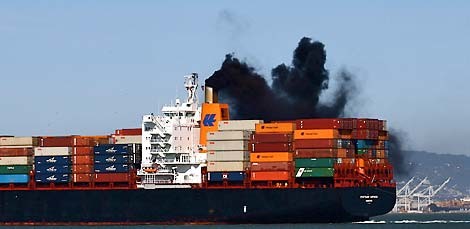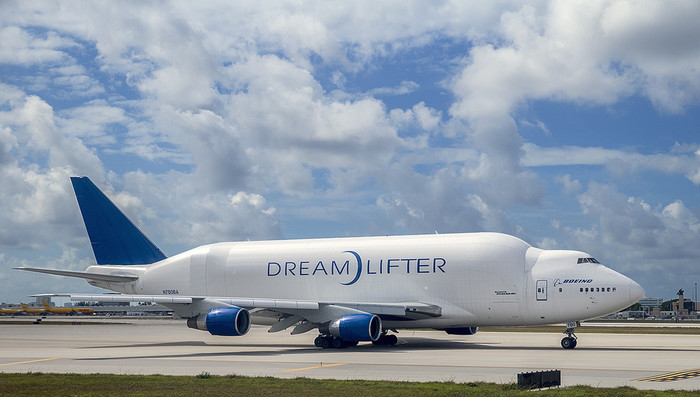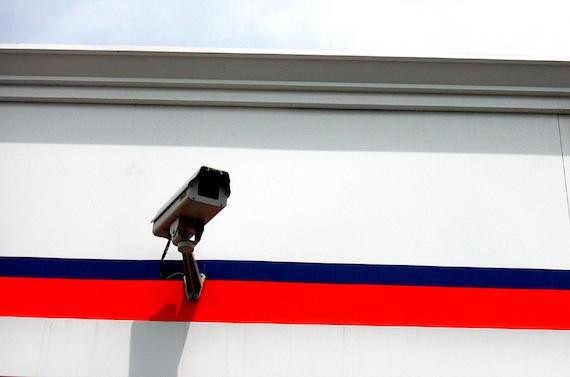
Image by Flickr user Jen SFO-BCN Image by 20080922pollution.jpg Ship exhaust: Not a color you want to inhale.
At first glance, a report from the South Carolina State Ports Authority is seemingly good news: port related operations during 2005 accounted for some 5% (and declining) amount of the tri-county area's pollutants. By far the largest source of pollutants observed were, unsurprisingly, from ships and trucks.
But the story gets a bit more interesting when you look at sulfur oxide emissions.
The factually oriented 70-page report calls little attention to how more than 90% of the port's sulfe oxide emissions come from cargo ships.
The excess emission of the compound is particularly bad for three things we have a lot of here: Breathing by the elderly and children, historic buildings, and water quality.
This pollution from ships is largely an issue all over the world, as large ships generally burn a far nastier version of diesel fuel that you won't find at your local gas pump. Ships are allowed to do this largely because at sea it's harder to regulate things (ever been on a booze cruise?). The problem is so bad that congress has tried to regulate the problem. But California was proactive and ordered that the big ships within 24-miles of the coast must use cleaner fuel.
But while sulfur oxide emissions have generally been declining across the country, levels have been holding steady in Charleston.
It's bit shocking to see the port glance over the seriousness of sulfur oxide emissions from cargo ships (as they made no mention of the high level in their press release), especially when they tout how they've cut sulfur emissions:
Since 2005, the SCSPA has taken on numerous projects to reduce port-related air emissions, including:
- Replacing diesel-fueled cranes and equipment with electric cranes and cleaner fuels. Just this spring, four giant diesel container cranes left the port after being replaced by all-electric models, eliminating their diesel emissions.
- Along with nine other transportation firms, switching to ultra-low sulfur diesel with 15 parts per million (ppm) sulfur content, instead of fuel containing as much as 500 ppm. This voluntary move came more than two years ahead of a federal mandate for non-road diesel equipment.
It's a sort of "Thanks for painting the house, but when are you going to put the roof on?" moment.
 WikipediaSulfur dioxide classically comes from the not-innocent source of volcanoes.The summary report does mention that the U.S. has recently joined MARPOL Annex VI, an international agreement which will drastically reduce emissions from ships. At the time of signing The Post and Courier wrote:
WikipediaSulfur dioxide classically comes from the not-innocent source of volcanoes.The summary report does mention that the U.S. has recently joined MARPOL Annex VI, an international agreement which will drastically reduce emissions from ships. At the time of signing The Post and Courier wrote:
MARPOL currently requires treaty members to reduce sulfur emissions from their ships by 22 percent by 2012, with a further 86 percent reduction by 2020. Even then, however, the sulfur content of bunker fuel will be far greater than the current U.S. standard for trucks. There is long way to go before ships in Charleston harbor use fuel as clean as trucks.
And, indeed they won't, ship emissions in Charleston would need to be reduced by some 92% just to bring them on par with sulfur emissions from the port's other activities before they switched or ditched sulfur fuels.
My intent is not to belittle the port's accomplishments, and the state port is in little position to regulate what congress has had little success in doing, but calling more attention to the problem would go a long way towards finding a cost-effective solution.
Just a few days ago Report Charlotte Gutman wrote about how we received an “F” by the American Lung Association for our air quality.
Small steps like the one's the port have made will most certainly get us where we need to go, but this one step is not enough and more progress needs to be planned.
Update September 23: The Post and Courier has their own piece on the report, and it pretty much has the same message as mine. They also got this great quote from Nancy Vinson at the Coastal Conservation League:
[The port is] probably the top air polluter in the city of Charleston. In the whole tri-county area you've got big cement plants and coal-fired power plants that are much farther from people and have much taller stacks, so it's not at ground level.


